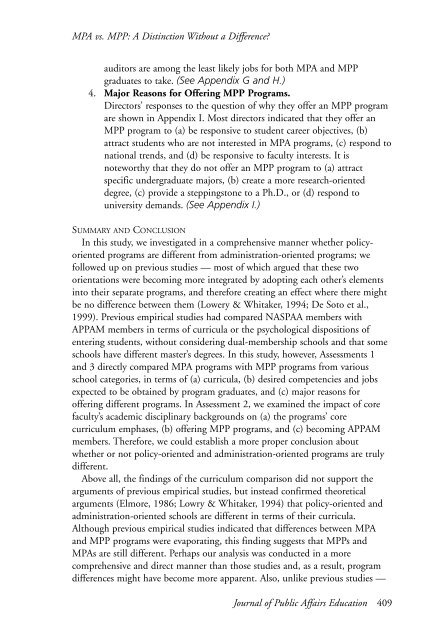JOURNAL OF PUBLIC AFFAIRS EDUCATION - National ...
JOURNAL OF PUBLIC AFFAIRS EDUCATION - National ...
JOURNAL OF PUBLIC AFFAIRS EDUCATION - National ...
Create successful ePaper yourself
Turn your PDF publications into a flip-book with our unique Google optimized e-Paper software.
MPA vs. MPP: A Distinction Without a Difference?<br />
auditors are among the least likely jobs for both MPA and MPP<br />
graduates to take. (See Appendix G and H.)<br />
4. Major Reasons for Offering MPP Programs.<br />
Directors’ responses to the question of why they offer an MPP program<br />
are shown in Appendix I. Most directors indicated that they offer an<br />
MPP program to (a) be responsive to student career objectives, (b)<br />
attract students who are not interested in MPA programs, (c) respond to<br />
national trends, and (d) be responsive to faculty interests. It is<br />
noteworthy that they do not offer an MPP program to (a) attract<br />
specific undergraduate majors, (b) create a more research-oriented<br />
degree, (c) provide a steppingstone to a Ph.D., or (d) respond to<br />
university demands. (See Appendix I.)<br />
SUMMARY AND CONCLUSION<br />
In this study, we investigated in a comprehensive manner whether policyoriented<br />
programs are different from administration-oriented programs; we<br />
followed up on previous studies — most of which argued that these two<br />
orientations were becoming more integrated by adopting each other’s elements<br />
into their separate programs, and therefore creating an effect where there might<br />
be no difference between them (Lowery & Whitaker, 1994; De Soto et al.,<br />
1999). Previous empirical studies had compared NASPAA members with<br />
APPAM members in terms of curricula or the psychological dispositions of<br />
entering students, without considering dual-membership schools and that some<br />
schools have different master’s degrees. In this study, however, Assessments 1<br />
and 3 directly compared MPA programs with MPP programs from various<br />
school categories, in terms of (a) curricula, (b) desired competencies and jobs<br />
expected to be obtained by program graduates, and (c) major reasons for<br />
offering different programs. In Assessment 2, we examined the impact of core<br />
faculty’s academic disciplinary backgrounds on (a) the programs’ core<br />
curriculum emphases, (b) offering MPP programs, and (c) becoming APPAM<br />
members. Therefore, we could establish a more proper conclusion about<br />
whether or not policy-oriented and administration-oriented programs are truly<br />
different.<br />
Above all, the findings of the curriculum comparison did not support the<br />
arguments of previous empirical studies, but instead confirmed theoretical<br />
arguments (Elmore, 1986; Lowry & Whitaker, 1994) that policy-oriented and<br />
administration-oriented schools are different in terms of their curricula.<br />
Although previous empirical studies indicated that differences between MPA<br />
and MPP programs were evaporating, this finding suggests that MPPs and<br />
MPAs are still different. Perhaps our analysis was conducted in a more<br />
comprehensive and direct manner than those studies and, as a result, program<br />
differences might have become more apparent. Also, unlike previous studies —<br />
Journal of Public Affairs Education 409

















